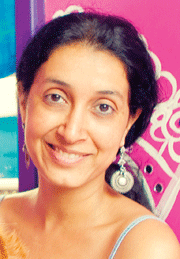“We have a long way to go”
 Matthew Schneeberger interviewed Shaheen Mistri, CEO of Teach For India (TFI), which has placed 506 teacher fellows in 164 low-income schools in Mumbai and Pune. Mistri is also founder of the Akanksha Foundation, which runs 40 after-school centres and 13 free-of-charge schools in Pune and Mumbai.
Matthew Schneeberger interviewed Shaheen Mistri, CEO of Teach For India (TFI), which has placed 506 teacher fellows in 164 low-income schools in Mumbai and Pune. Mistri is also founder of the Akanksha Foundation, which runs 40 after-school centres and 13 free-of-charge schools in Pune and Mumbai.
How satisfied are you with the growth and development of TFI over the past five years?
In terms of number and scale, we are where we planned to be and the diversity and quality of the fellows TFI has attracted is excellent. But we still have a long way to go, and there’s a huge amount we need to learn.
What’s the impact of TFI fellows in the classrooms of low-income under-served schools?
Some classrooms have recorded huge learning leaps but many are still struggling. We need to figure out a way to raise the floor while also pushing up the ceiling. It’s a big challenge, a complex issue worldwide. In our classrooms, English is often the third language; there’s a huge diversity of ages, often a seven-year gap and often 40 children to a class. All this make it very difficult to measure impact.
How is TFI dealing with the popular belief that teaching is a fall-back profession in India?
We need to do a whole lot of convincing of graduates and then, of their families. But I think TFI is already changing the stereotypical image of teachers because people with multiple career options are choosing to teach. This has had a ripple effect. I think long-term, we need more high-quality schools so teachers feel like making an immediate impact, do great things and be well-supported.
What problems do Teach For India fellows face in classrooms, with students and schools?
Within the students’ families there is absolutely no opposition. When parents see value being delivered to their children, they’re on our side right away. They’re our greatest supporters. These are hugely untapped communities which we need to leverage much more.
The school-level problems we’ve faced have been very challenging. Every school is different and besides, many of our fellows — most of them 23-24 years old — have little experience of dealing with children from very different backgrounds. When a fellow goes in with a willingness to learn from the system, it works well. Overall we’ve done a lot of training with fellows, about how to transform their class-rooms into exemplary teaching-learning environments.
Given India’s unique challenges, how is TFI innovating in the classroom compared to the global TFA model?
We’re pushing conversations with the community a lot. Our fellows are well aware of the roles of family and community in children’s education. Typically, training programmes focus on developing technical excellence. But to build leaders for the long-term we need to focus on changing mindsets and developing the values of TFI fellows. TFI training programmes have done a lot of experimentation with experiential learning and immersion. A lot of things that we’re doing in our programme other countries are now piloting An India-specific initiative is our ‘Be the Change’ project which provides space for each of our fellows to ideate and work on a leadership project through their second year.
At present you’re in five cities. What about rural India?
It’s too early yet. In good time we will cover rural schools. We should hasten carefully.















Add comment